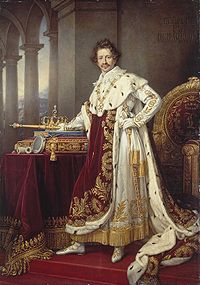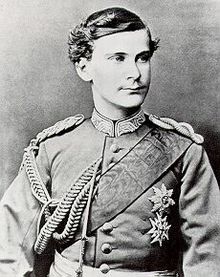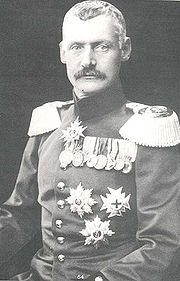
King of Bavaria
Encyclopedia
.jpg)
Wittelsbach
The Wittelsbach family is a European royal family and a German dynasty from Bavaria.Members of the family served as Dukes, Electors and Kings of Bavaria , Counts Palatine of the Rhine , Margraves of Brandenburg , Counts of Holland, Hainaut and Zeeland , Elector-Archbishops of Cologne , Dukes of...
rulers of Bavaria
Bavaria
Bavaria, formally the Free State of Bavaria is a state of Germany, located in the southeast of Germany. With an area of , it is the largest state by area, forming almost 20% of the total land area of Germany...
in the state known as the Kingdom of Bavaria
Kingdom of Bavaria
The Kingdom of Bavaria was a German state that existed from 1806 to 1918. The Bavarian Elector Maximilian IV Joseph of the House of Wittelsbach became the first King of Bavaria in 1806 as Maximilian I Joseph. The monarchy would remain held by the Wittelsbachs until the kingdom's dissolution in 1918...
from 1805 until 1918, when the kingdom was abolished. It was the second kingdom, almost a thousand years after the short-lived Carolingian
Carolingian
The Carolingian dynasty was a Frankish noble family with origins in the Arnulfing and Pippinid clans of the 7th century AD. The name "Carolingian", Medieval Latin karolingi, an altered form of an unattested Old High German *karling, kerling The Carolingian dynasty (known variously as the...
kingdom of Bavaria.
Outline
Under the terms of the Treaty of Pressburg concluded December 26, 1805 between Napoleonic FranceFrance
The French Republic , The French Republic , The French Republic , (commonly known as France , is a unitary semi-presidential republic in Western Europe with several overseas territories and islands located on other continents and in the Indian, Pacific, and Atlantic oceans. Metropolitan France...
and Holy Roman Emperor
Holy Roman Emperor
The Holy Roman Emperor is a term used by historians to denote a medieval ruler who, as German King, had also received the title of "Emperor of the Romans" from the Pope...
Francis II
Francis II, Holy Roman Emperor
Francis II was the last Holy Roman Emperor, ruling from 1792 until 6 August 1806, when he dissolved the Empire after the disastrous defeat of the Third Coalition by Napoleon at the Battle of Austerlitz...
, several principalities
Principality
A principality is a monarchical feudatory or sovereign state, ruled or reigned over by a monarch with the title of prince or princess, or by a monarch with another title within the generic use of the term prince....
allied to Napoleon were elevated to kingdoms
Monarchy
A monarchy is a form of government in which the office of head of state is usually held until death or abdication and is often hereditary and includes a royal house. In some cases, the monarch is elected...
. One of the staunchest of these had been the prince-elector
Prince-elector
The Prince-electors of the Holy Roman Empire were the members of the electoral college of the Holy Roman Empire, having the function of electing the Roman king or, from the middle of the 16th century onwards, directly the Holy Roman Emperor.The heir-apparent to a prince-elector was known as an...
of Bavaria, Maximilian IV Joseph, and on January 1, 1806, he formally assumed the title King Maximilian I Joseph of Bavaria. He was a member of the Wittelsbach branch Palatinate-Birkenfeld-Zweibrücken
House of Palatinate-Birkenfeld
Palatinate-Birkenfeld , later Palatinate-Zweibrücken-Birkenfeld, was the name of a collateral line of the Palatine Wittelsbachs. The Counts Palatine from this line initially ruled over only a relatively unimportant territory, namely the Palatine share of the Rear County of Sponheim; however, their...
.
Maximilian's successors resisted German nationalism, and Bavaria became the protector of smaller states whose leaders felt threatened by Prussia
Prussia
Prussia was a German kingdom and historic state originating out of the Duchy of Prussia and the Margraviate of Brandenburg. For centuries, the House of Hohenzollern ruled Prussia, successfully expanding its size by way of an unusually well-organized and effective army. Prussia shaped the history...
or Austria
Austria
Austria , officially the Republic of Austria , is a landlocked country of roughly 8.4 million people in Central Europe. It is bordered by the Czech Republic and Germany to the north, Slovakia and Hungary to the east, Slovenia and Italy to the south, and Switzerland and Liechtenstein to the...
in the German Confederation
German Confederation
The German Confederation was the loose association of Central European states created by the Congress of Vienna in 1815 to coordinate the economies of separate German-speaking countries. It acted as a buffer between the powerful states of Austria and Prussia...
. Religious ties linked the state more to Austria until their defeat in the Austro-Prussian War
Austro-Prussian War
The Austro-Prussian War was a war fought in 1866 between the German Confederation under the leadership of the Austrian Empire and its German allies on one side and the Kingdom of Prussia with its German allies and Italy on the...
. King Ludwig II
Ludwig II of Bavaria
Ludwig II was King of Bavaria from 1864 until shortly before his death. He is sometimes called the Swan King and der Märchenkönig, the Fairy tale King...
signed an alliance with Prussia on 22 August 1866, effectively relinquishing Bavarian independence.
With the treaty of 23 November 1870 Bavaria was integrated into the new German Empire
German Empire
The German Empire refers to Germany during the "Second Reich" period from the unification of Germany and proclamation of Wilhelm I as German Emperor on 18 January 1871, to 1918, when it became a federal republic after defeat in World War I and the abdication of the Emperor, Wilhelm II.The German...
, but permitted a relatively large degree of self-determination. The Kings of Bavaria maintained their titles, and maintained separate diplomatic and military corps. When the German Empire was abolished in November 1918 after the end of World War I
World War I
World War I , which was predominantly called the World War or the Great War from its occurrence until 1939, and the First World War or World War I thereafter, was a major war centred in Europe that began on 28 July 1914 and lasted until 11 November 1918...
, the last king of Bavaria, Ludwig III
Ludwig III of Bavaria
Ludwig III , was the last King of Bavaria, reigning from 1913 to 1918.-Early life:...
, was deposed.
Kings of Bavaria
- Maximilian I Joseph 1805–1825
- Ludwig ILudwig I of BavariaLudwig I was a German king of Bavaria from 1825 until the 1848 revolutions in the German states.-Crown prince:...
1825–1848 (d.1868) - Maximilian IIMaximilian II of BavariaMaximilian II of Bavaria was king of Bavaria from 1848 until 1864. He was son of Ludwig I of Bavaria and Therese of Saxe-Hildburghausen.-Crown Prince:...
1848–1864 - Ludwig IILudwig II of BavariaLudwig II was King of Bavaria from 1864 until shortly before his death. He is sometimes called the Swan King and der Märchenkönig, the Fairy tale King...
1864–1886 - OttoOtto of BavariaOtto , was King of Bavaria from 1886 to 1913. He was the son of Maximilian II and his wife, Marie of Prussia, and younger brother of Ludwig II...
1886–1913 (d.1916)- Prince Luitpold of BavariaLuitpold, Prince Regent of BavariaLuitpold, Prince Regent of Bavaria , was the de facto ruler of Bavaria from 1886 to 1912, due to the incapacity of his nephews, King Ludwig II and King Otto.-Early life:...
, Regent 1886–1912 - Prince Ludwig of BavariaLudwig III of BavariaLudwig III , was the last King of Bavaria, reigning from 1913 to 1918.-Early life:...
, Regent 1912–1913
- Prince Luitpold of Bavaria
- Ludwig IIILudwig III of BavariaLudwig III , was the last King of Bavaria, reigning from 1913 to 1918.-Early life:...
1913–1918
The title King of Bavaria is sometimes used in reference to Carolingian
Carolingian
The Carolingian dynasty was a Frankish noble family with origins in the Arnulfing and Pippinid clans of the 7th century AD. The name "Carolingian", Medieval Latin karolingi, an altered form of an unattested Old High German *karling, kerling The Carolingian dynasty (known variously as the...
kings ruling over Bavaria. See List of rulers of Bavaria for these.
Royal Bavaria
| Name | | Image | Title | Start term | | End term | House | | Official Title | | Note |
|---|---|---|---|---|---|---|---|
| Maximilian I Joseph of Bavaria |  |
Elector Palatine King of Bavaria |
1799 | 1825 | Wittelsbach | His Majesty Maximilian Joseph, King of Bavaria | Son of Count Palatine Frederick Michael of Zweibrücken Count Palatine Frederick Michael of Zweibrücken Frederick Michael, Count Palatine of Zweibrücken-Birkenfeld was a member of the Wittelsbach dynasty. He was the father of Maximilian I Joseph of Bavaria... . Distant cousin of his predecessor Elector Charles Theodore Charles Theodore, Elector of Bavaria Charles Theodore, Prince-Elector, Count Palatine and Duke of Bavaria reigned as Prince-Elector and Count palatine from 1742, as Duke of Jülich and Berg from 1742 and also as Prince-Elector and Duke of Bavaria from 1777, until his death... ; Count Palatine of Zweibrücken from 1795. In the chaos of the wars of the French Revolution French Revolution The French Revolution , sometimes distinguished as the 'Great French Revolution' , was a period of radical social and political upheaval in France and Europe. The absolute monarchy that had ruled France for centuries collapsed in three years... , the old order of the Holy Roman Empire Holy Roman Empire The Holy Roman Empire was a realm that existed from 962 to 1806 in Central Europe.It was ruled by the Holy Roman Emperor. Its character changed during the Middle Ages and the Early Modern period, when the power of the emperor gradually weakened in favour of the princes... collapsed. In the course of these events, Bavaria became once again the ally of France, and Maximilian IV Joseph abandoned his Electoral title — as there would soon be no Emperor to elect — for the title of King of Bavaria, becoming Maximilian I on 1 January 1806. |
| Ludwig I Augustus Ludwig I of Bavaria Ludwig I was a German king of Bavaria from 1825 until the 1848 revolutions in the German states.-Crown prince:... |
 |
King of Bavaria | 1825 | 1848 | Wittelsbach | His Majesty Ludwig, King of Bavaria, Duke of Franconia and in Swabia, Count Palatine of the Rhine. | Son of Maximilian I Joseph. Abdicated in the Revolutions of 1848 Revolutions of 1848 in the German states The Revolutions of 1848 in the German states, also called the March Revolution – part of the Revolutions of 1848 that broke out in many countries of Europe – were a series of loosely coordinated protests and rebellions in the states of the German Confederation, including the Austrian Empire... |
| Maximilian II Maximilian II of Bavaria Maximilian II of Bavaria was king of Bavaria from 1848 until 1864. He was son of Ludwig I of Bavaria and Therese of Saxe-Hildburghausen.-Crown Prince:... |
 |
King of Bavaria | 1848 | 1864 | Wittelsbach | His Majesty Maximilian, King of Bavaria, Duke of Franconia and in Swabia, Count Palatine of the Rhine. | Son of Ludwig I Augustus Ludwig I of Bavaria Ludwig I was a German king of Bavaria from 1825 until the 1848 revolutions in the German states.-Crown prince:... |
| Ludwig II Ludwig II of Bavaria Ludwig II was King of Bavaria from 1864 until shortly before his death. He is sometimes called the Swan King and der Märchenkönig, the Fairy tale King... |
 |
King of Bavaria | 1864 | 1886 | Wittelsbach | His Majesty Ludwig, King of Bavaria, Duke of Franconia and in Swabia, Count Palatine of the Rhine. | Son of Maximilian II Maximilian II of Bavaria Maximilian II of Bavaria was king of Bavaria from 1848 until 1864. He was son of Ludwig I of Bavaria and Therese of Saxe-Hildburghausen.-Crown Prince:... Ludig II was called the Märchenkönig (Fairy tale king). He acceded to Bavaria becoming a component of the German Empire German Empire The German Empire refers to Germany during the "Second Reich" period from the unification of Germany and proclamation of Wilhelm I as German Emperor on 18 January 1871, to 1918, when it became a federal republic after defeat in World War I and the abdication of the Emperor, Wilhelm II.The German... in 1871, he was declared insane in 1886. |
| Otto I Otto of Bavaria Otto , was King of Bavaria from 1886 to 1913. He was the son of Maximilian II and his wife, Marie of Prussia, and younger brother of Ludwig II... |
 |
King of Bavaria | 1886 | 1913 | Wittelsbach | His Majesty Otto, King of Bavaria, Duke of Franconia and in Swabia, Count Palatine of the Rhine. | Son of Maximilian II Maximilian II of Bavaria Maximilian II of Bavaria was king of Bavaria from 1848 until 1864. He was son of Ludwig I of Bavaria and Therese of Saxe-Hildburghausen.-Crown Prince:... . Otto was mentally ill throughout his reign, and his functions were carried out by the following prince regent Prince Regent A prince regent is a prince who rules a monarchy as regent instead of a monarch, e.g., due to the Sovereign's incapacity or absence .... s:
|
| Prince Regent Luitpold Luitpold, Prince Regent of Bavaria Luitpold, Prince Regent of Bavaria , was the de facto ruler of Bavaria from 1886 to 1912, due to the incapacity of his nephews, King Ludwig II and King Otto.-Early life:... |
 |
Prince Regent Prince Regent A prince regent is a prince who rules a monarchy as regent instead of a monarch, e.g., due to the Sovereign's incapacity or absence .... of Bavaria |
1886 | 1912 | Wittelsbach | His Royal Highness Luitpold, Prince Regent of Bavaria, Duke of Bavaria, of Franconia and in Swabia, Count Palatine of the Rhine | Son of Ludwig I Ludwig I of Bavaria Ludwig I was a German king of Bavaria from 1825 until the 1848 revolutions in the German states.-Crown prince:... , Prince Regent of Bavaria for the Kings Ludwig II and Otto. |
| Ludwig III Ludwig III of Bavaria Ludwig III , was the last King of Bavaria, reigning from 1913 to 1918.-Early life:... |
 |
Prince Regent of Bavaria King of Bavaria |
1913 | 1918 | Wittelsbach | His Majesty Ludwig, King of Bavaria, Duke of Franconia and in Swabia, Count Palatine of the Rhine. | Son of Prince Luitpold Luitpold, Prince Regent of Bavaria Luitpold, Prince Regent of Bavaria , was the de facto ruler of Bavaria from 1886 to 1912, due to the incapacity of his nephews, King Ludwig II and King Otto.-Early life:... . Prince regent from 1912 until 1913, Then King of Bavaria, he lost his throne in the German revolutions German Revolution The German Revolution was the politically-driven civil conflict in Germany at the end of World War I, which resulted in the replacement of Germany's imperial government with a republic... at the end of the First World War World War I World War I , which was predominantly called the World War or the Great War from its occurrence until 1939, and the First World War or World War I thereafter, was a major war centred in Europe that began on 28 July 1914 and lasted until 11 November 1918... . |
| Crown Prince Rupprecht Rupprecht, Crown Prince of Bavaria Rupprecht or Rupert, Crown Prince of Bavaria was the last Bavarian Crown Prince.His full title was His Royal Highness Rupprecht Maria Luitpold Ferdinand, Crown Prince of Bavaria, Duke of Bavaria, of Franconia and in Swabia, Count Palatine of the Rhine... |
 |
Crown Prince Crown Prince A crown prince or crown princess is the heir or heiress apparent to the throne in a royal or imperial monarchy. The wife of a crown prince is also titled crown princess.... of Bavaria |
1913 | 1955 | Wittelsbach | His Royal Highness Rupprecht Maria Luitpold Ferdinand, Crown Prince of Bavaria, Duke of Bavaria, of Franconia and in Swabia, Count Palatine of the Rhine | Son of Ludwig III Ludwig III of Bavaria Ludwig III , was the last King of Bavaria, reigning from 1913 to 1918.-Early life:... , Last Crown Prince of Bavaria. |
Current Heir
Franz Bonaventura Adalbert Maria Herzog von BayernFranz, Duke of Bavaria
Franz Bonaventura Adalbert Maria Herzog von Bayern , styled as His Royal Highness The Duke of Bavaria, is head of the Wittelsbach family, the former ruling family of the Kingdom of Bavaria...
(born July 14, 1933), styled as His Royal Highness The Duke of Bavaria, is head of the Wittelsbach
Wittelsbach
The Wittelsbach family is a European royal family and a German dynasty from Bavaria.Members of the family served as Dukes, Electors and Kings of Bavaria , Counts Palatine of the Rhine , Margraves of Brandenburg , Counts of Holland, Hainaut and Zeeland , Elector-Archbishops of Cologne , Dukes of...
family, the former ruling family of the Kingdom of Bavaria.

